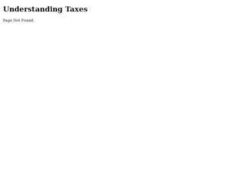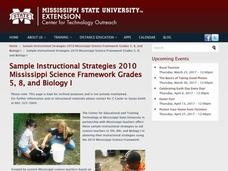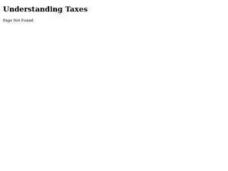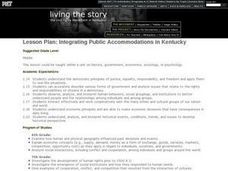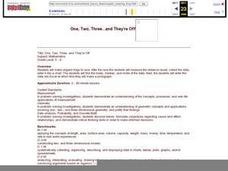Curated OER
The Giving Tree
Little literature analysts listen as you read The Giving Tree to them and discuss other ways the tree could have helped the little boy.A three-column chart is given to each individual showing what the tree and boy gave to each...
Curated OER
First Meeting of the Indians and the Europeans
Your class hears a Native American Indian point of view of Europeans' arrival in Louisiana. They assess how cultural perspectives (especially an insider's view) and native language can shape a story. Each pupil identifies the...
Curated OER
The Pony Express
Fourth graders answer four math questions based on their reading of a short story on the history of the Pony Express.
Alabama Learning Exchange
Money Management
Students discuss the differences between needs and wants, practice budgeting resources and investigate the workings of a capitalist society, by creating a mock store.
Curated OER
The Wealth Tax of 1935 and the Victory Tax of 1942
Young scholars explain that during the Great Depression and World War II, the Roosevelt administration implemented new, broader, and more progressive taxes in order to cover the costs of the New Deal programs and the war.
Curated OER
Menu Math
Students follow the food pyramid to create a daily food budget. They research food prices online or in newspapers. They graph the amount of each food group included in their menus. They can also create a weekly food menu based on a fixed...
Curated OER
Your Role as a Taxpayer: Why Pay Taxes?
Students evaluate the basic rationale, nature, and consequences fo taxes. They describe why governments need taxes as revenue to provide goods and servicesin this series of activities.
Curated OER
The Taxpayer's Responsibilities
Students explore system of voluntary compliance, and describe taxpayers' responsibilities related to filing a tax return.
Curated OER
The Taxpayer's Rights
Learners examine rights of taxpayers and procedures the IRS uses to process tax returns
Curated OER
Constitutional Convention
Students examine the structure and function of the United States government established by the Constitution. They also explore the problems the country faced under the Articles of Confederation.
Curated OER
Integrating Public Accommodations in Kentucky
Learners watch videos and conduct research on the belief systems and values related to segregation in Kentucky.
Curated OER
Sexual Exploitation, Day 1
Students discuss safe/unsafe and healthy/unhealthy touching. They discuss examples and ways of recognizing and getting out of exploitive situations.
Curated OER
Estimation
Students estimate the cost of individual items found on a typical grocery list. They participte in a teacher-led demonstration, solve word problems, and estimate the cost of ten items placed into their group's grocery basket.
Curated OER
At Your Service
Students discuss various volunteer activities and read how New York City organizes its volunteer efforts. They create their own databases compiling volunteer opportunities and write reflective essays on how volunteers help their...
Curated OER
Field Trips Can Inspire Students to Write Creatively
Fieldtrips can lead to a variety of writing experiences for students.
Curated OER
Money Management Intelligence
Students follow directions to help a client with his/her budget. After selecting their client, they download confidential data and listen to the challenge presented on the website. They adjust the budgets as needed. Then, they click play...
Curated OER
Economic Market Pain
Students read and discuss article, and write an interpretation of the message for a class newspaper.
Curated OER
One, Two, Three...and They're Off
Students make origami frogs to race. After the race they measure the distance raced, collect the data, enter it into a chart. They then find the mean, median, and mode of the data. Next, students enter this data into Excel at which time...
Curated OER
Changing With the Tide
Students research and they role-play the behavior of plants and animals in a salt marsh habitat as the tides change.
Curated OER
Play the Market
Students participate in a hypothetical experiment. For four weeks, they track 10 stocks they have selected. They discuss their imaginary gains and losses and share their observations about the stock market, and their reactions to this...
Curated OER
Swimming Survivor Challenge IV
Students practice using a mask, snorkel, and fins to collect items from the bottom of a pool.
Curated OER
This Way with Hemingway
Students work as travel agents to plan an around-the-world trip to all of Hemingway's favorite world locations. They plan an itinerary which includes facets of the trip and record the information in their journals.
Curated OER
Where Did the Science Experiments Go?
Hands-on science experiments are essential for student learning.
Curated OER
How Bad Are They?
Students consider a moral dilemma and state their response in English. They practice using a conditional phrase "if...then"






